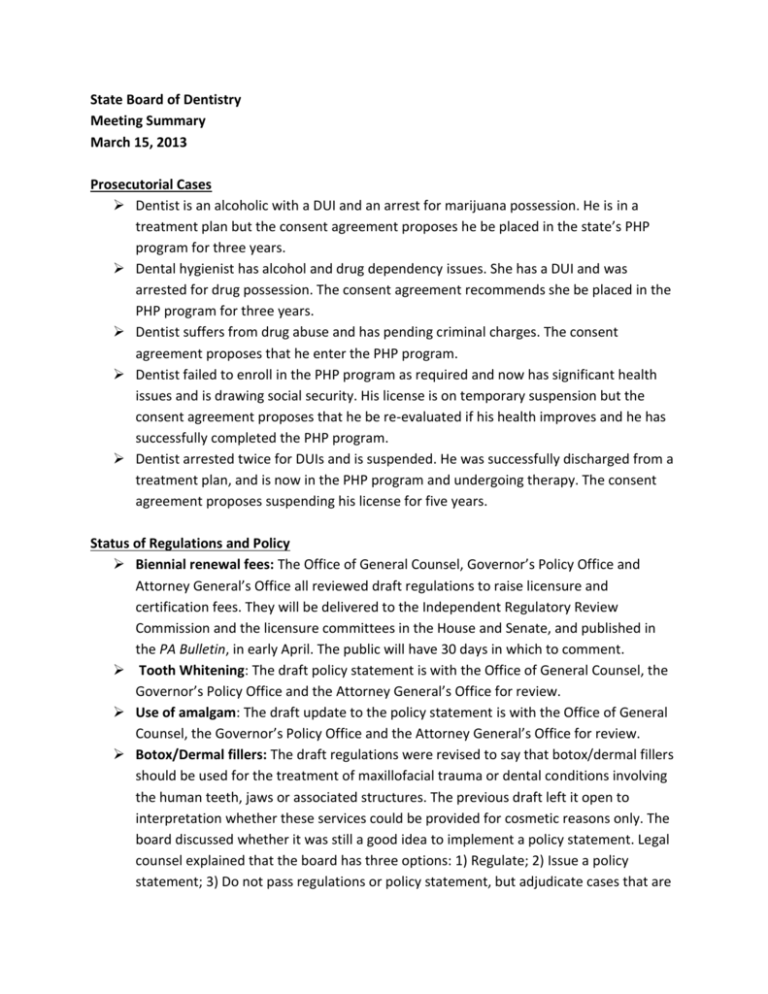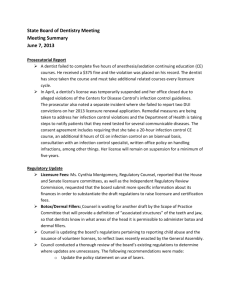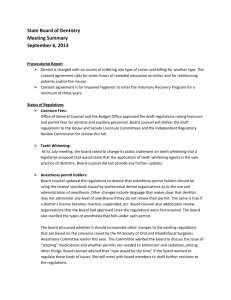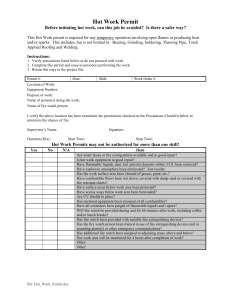March 13, 2013
advertisement

State Board of Dentistry Meeting Summary March 15, 2013 Prosecutorial Cases Dentist is an alcoholic with a DUI and an arrest for marijuana possession. He is in a treatment plan but the consent agreement proposes he be placed in the state’s PHP program for three years. Dental hygienist has alcohol and drug dependency issues. She has a DUI and was arrested for drug possession. The consent agreement recommends she be placed in the PHP program for three years. Dentist suffers from drug abuse and has pending criminal charges. The consent agreement proposes that he enter the PHP program. Dentist failed to enroll in the PHP program as required and now has significant health issues and is drawing social security. His license is on temporary suspension but the consent agreement proposes that he be re-evaluated if his health improves and he has successfully completed the PHP program. Dentist arrested twice for DUIs and is suspended. He was successfully discharged from a treatment plan, and is now in the PHP program and undergoing therapy. The consent agreement proposes suspending his license for five years. Status of Regulations and Policy Biennial renewal fees: The Office of General Counsel, Governor’s Policy Office and Attorney General’s Office all reviewed draft regulations to raise licensure and certification fees. They will be delivered to the Independent Regulatory Review Commission and the licensure committees in the House and Senate, and published in the PA Bulletin, in early April. The public will have 30 days in which to comment. Tooth Whitening: The draft policy statement is with the Office of General Counsel, the Governor’s Policy Office and the Attorney General’s Office for review. Use of amalgam: The draft update to the policy statement is with the Office of General Counsel, the Governor’s Policy Office and the Attorney General’s Office for review. Botox/Dermal fillers: The draft regulations were revised to say that botox/dermal fillers should be used for the treatment of maxillofacial trauma or dental conditions involving the human teeth, jaws or associated structures. The previous draft left it open to interpretation whether these services could be provided for cosmetic reasons only. The board discussed whether it was still a good idea to implement a policy statement. Legal counsel explained that the board has three options: 1) Regulate; 2) Issue a policy statement; 3) Do not pass regulations or policy statement, but adjudicate cases that are brought before it. The board still generally believes that a policy statement is needed but that there must be a clearer definition of “associated structures.” The new draft policy statement was referred to the Scope of Practice Committee for review. The committee was also directed to draft a definition of “associated structures.” Also, Dr. Deem asked for PDA to submit comments on the new draft policy statement (see attached). Chair’s Report Dr. David Dattilo and Dr. Ronald Plesco, new board members, introduced themselves to the public. Dr. Dattilo is an oral surgeon from the Pittsburgh area. Dr. Plesco is a general dentist from the Pittsburgh area and has treated Governor Tom Corbett for more than 30 years. Dr. Deem would like the board to focus on these issues: o Finalizing the botox/dermal fillers policy statement. o Revisiting the issue of practice ownership. She is not sure the board should rely on a 1938 statute to make the case that only dentists may own dental practices. o Deciding whether the board should change regulations to allow public health dental hygienists to independently supervise dental assistants and EFDAs for narrowly-defined procedures. o Become more proactive with the Northeast Regional Boards (NERB). Most states’ dental board members are examiners but there are only 10 examiners in total from Pennsylvania. Dr. Deem encouraged board members to become more active with NERB so that Pennsylvania is better represented. o Dr. Deem values feedback from stakeholders and asks that they correspond frequently in writing and to speak up at meetings. Committee Reports Dr. Deem recently selected Dr. Erhard to serve as chair of the Licensure Committee. He discussed in detail the differences between regional examinations, explaining that he learned a wealth of information while investigating why NERB made passage of the clinical periodontology portion of the examination optional for students. He was given three reasons: o There were no reported failures in years. o Many dentists do not use this skill set. o ADEX is creating a new type of periodontal exam. There are at least 10 states requiring licensure applicants to have passed the clinical periodontology part of a regional exam. The Licensure Committee will offer recommendations to the full board on how to handle this issue for the next licensure cycle. Dr. Erhard also intends for the committee to review NERB’s prostodontic and endodontic testing requirements. Dr. DeFinnis, chair of the Practice Ownership Committee, reported that Massachusetts recently passed a law regarding mobile dentistry. He suggests the board use this is a model when finalizing its regulations. He believes that, at the very least, the board should adopt a policy stating that dentists’ treatment decisions must not be influenced by other entities or individuals who may want to base decisions on financial and/or business interests. The board should respect group practices while providing guidance on ownership issues. Dr. DeFinnis intends to meet with legal counsel to begin drafting regulations and/or policy statements. The committee will also fine tune the draft regulations on mobile dentistry. Dr. Deem asked the Regulatory Review Committee to draft an opinion on HB 272 that will be sent to the House and Senate licensure committees. The board does not feel that HB 272 should restrict unlimited renewals of faculty licenses to foreign-trained dentists who have passed a CODA-approved specialty program only. The board believes foreigntrained dentists who are general practitioners should also benefit from the unlimited renewal provision in HB 272. The board re-established the EFDA Committee, of which Theresa Groody chairs. The board dissolved the Ethics and the Budget Committees, due to lack of activity. The DANB Liaison position was also eliminated. Anesthesia Permit Holder Update Dr. Robert Linder, chair of the PA Society of Oral and Maxillofacial Surgeons’ Anesthesia Advisory Committee, reported the following: There are 650 unrestricted and restricted permit I holders who undergo office inspections and clinical evaluations every six years. PSOMS held four free educational meetings for permit holders in 2012. PSOMS held five meetings to instruct peer evaluators in 2012. PSOMS is receiving feedback that some permit holders are borrowing equipment from colleagues when it comes time for an office inspection. Dr. Lindner asked whether evaluators can revisit these offices unannounced. The board cited Section 33.342 as justification for PSOMS’ evaluators to conduct unannounced office inspections and evaluations. In 2014, permit holders will need a capnography machine in order to meet new standards of care from professional dental groups. Dr. Linder asked the board to clarify whether permit holders should be required to purchase a capnography machine even if they are not due for an inspection in 2014, and the board answered “yes.” Based on the ADA’s guidelines on the use of general anesthesia and conscious sedation, PSOMS no longer believes it is appropriate for restricted I permit holders to use these two drugs: Propofol and Ketamine. These two drugs are most likely to cause patients to go into a deeper stage of anesthesia that could render them completely unconscious. CRNAs can only use an anesthetic up to the level allowed by the permit holder so they would not be able to administer those two drugs in offices of restricted permit I holders. PSOMS will notify permit holders of this change. PSOMS feels anyone using a mix of nitrous oxide and medication must obtain a restricted permit I. PSOMS would like the board to provide a definition of “incidents” that dentists must report to the board within 30 days, as noted in Section 33.341 of the regulations. Dr. Lindner suggested that the board should remind dentists of this requirement but mention that it is not intended to be punitive. Dr. Dattilo was directed to send a draft definition to board counsel. Board counsel recommended that the board take some time to consider PSOMS’ recommendations and questions that they did not provide answers to during the meeting. The board will advise PSOMS at a later date. Discussion Items Sleep Apnea: The Scope of Practice Committee will discuss this issue in more detail and whether there is a need for regulation or a policy statement. The board recommended that the Committee review a resolution that was presented by Dr. John Nase to the PDA’s House of Delegates a few years ago. Next Meeting Date: May 8, 2013 (Please note that the meeting was rescheduled from April 19)







